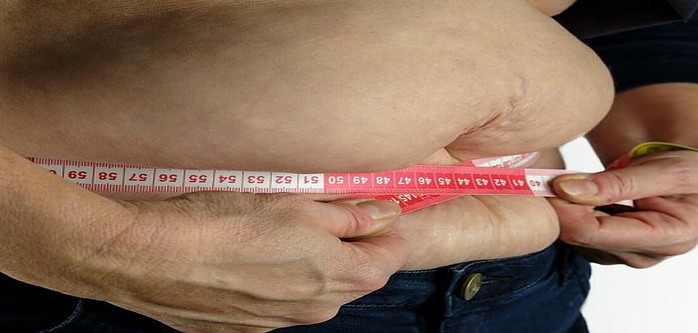Have you ever wondered if a few extra hours of sleep could help you manage your waistline better? Believe it or not, they might just be more interconnected than you think. The impact of sleep on belly fat should not be underestimated. When you’re not getting enough sleep, it kickstarts a sleep-fatigue cycle that has been linked to weight gain, specifically an increase in belly fat.  The story begins with two key players: ghrelin and leptin. These hormones are like the Yin and Yang of hunger and fullness. Ghrelin, often dubbed the ‘hunger hormone’, spikes when you’re sleep-deprived, telling your brain, ‘Hey, it’s time to eat.’ Meanwhile, leptin, which signals that you’re full, takes a nosedive. This imbalance can lead to overeating and, you guessed it, more belly fat.
The story begins with two key players: ghrelin and leptin. These hormones are like the Yin and Yang of hunger and fullness. Ghrelin, often dubbed the ‘hunger hormone’, spikes when you’re sleep-deprived, telling your brain, ‘Hey, it’s time to eat.’ Meanwhile, leptin, which signals that you’re full, takes a nosedive. This imbalance can lead to overeating and, you guessed it, more belly fat.
It’s not just about the munchies after a bad night’s sleep though. If you’re stuck in a chronic sleepless pattern, you’re also likely boosting your cortisol levels. Cortisol is the body’s stress hormone that, when elevated, encourages the storage of fat around the midsection. This could be your body’s way of stockpiling energy for all those wakeful hours when you’d rather be dreaming.
Moreover, a disrupted circadian rhythm, which is your body’s natural sleep-wake cycle, doesn’t just leave you feeling out of sorts; it messes with your metabolism too. Your body becomes less effective at processing insulin, the hormone that converts sugar to energy, which leads to higher blood sugar levels and, ultimately, more stored fat.
So, what does all this mean for your belly fat? A lot. It’s not a simple equation of calories in versus calories out but a complex interaction between sleep quality, hormonal balance, and metabolic processes. This sets the stage perfectly for our next section, where we dive into the scientific insights linking sleep duration to belly fat accumulation.
Scientific Insights: Sleep Duration and Belly Fat Accumulation
You’re going to find out about the profound ways in which the hours you spend sleeping can directly affect the fat around your waist. Let’s look at what studies have uncovered about sleep duration and its relationship with belly fat.  Across several research projects, a consistent pattern emerges: lack of sleep is associated with an increase in visceral fat, the type that surrounds your organs and poses significant health risks.
Across several research projects, a consistent pattern emerges: lack of sleep is associated with an increase in visceral fat, the type that surrounds your organs and poses significant health risks.
In my opinion, the role of deep sleep, or slow-wave sleep, can’t be overstressed. It’s during these critical phases of your sleep cycle that your body works tirelessly to regulate hormones and repair tissues. These processes are vital for maintaining a healthy metabolism and consequently, a healthy body weight. Less time in deep sleep means a body less equipped to handle fat storage and usage.
Moreover, when you don’t get enough sleep, your body experiences changes in hunger hormones, like ghrelin and leptin. This often leads to increased appetite and cravings for high-calorie, carbohydrate-rich foods. Translation? You’re more likely to engage in late-night snacking or overeating – habits that can contribute to gaining belly fat.
And guess what? There’s also a silver lining. Some studies suggest that improving sleep duration may help reverse the adverse effects on fat distribution. This includes reducing belly fat, provided that you’re combining better sleep with a balanced diet and regular exercise.
Your first attempt at tweaking your sleep schedule doesn’t need to be perfect. Start with small steps and pay attention to how your body responds. Could you be feeling less hungry, more energized, and noticing a slight decrease in belly fat? If so, you’re on the right track. These positive changes are signs it’s time to focus even more on improving your sleep quality.
Strategies for Improving Sleep Quality to Target Belly Fat
If you’re looking to tackle belly fat, it’s not just what you eat or how often you exercise that matters, your sleep quality plays a crucial role as well. Now, I’m going to help you with practical ways to get better sleep, which, in turn, can help manage that stubborn belly fat.
To begin with, setting up a consistent sleep schedule is key. Your body craves routine, and going to bed and waking up at the same times every day sets your internal clock to expect sleep. Moreover, creating a pre-sleep routine that might include reading or meditative breathing can significantly improve your sleep onset time.
Next, let’s talk about your bedroom environment. Keep your bedroom dark, cool, and quiet — think of it as your personal cave for rest. Investing in blackout curtains, perhaps a white noise machine, and ensuring your mattress and pillows are supportive, can make a world of difference.
Dietary adjustments can also be influential. Avoiding caffeine and heavy meals before bedtime is a smart move because they can disrupt your sleep. On the contrary, some foods like almonds, cherries, or turkey contain nutrients that could potentially support better sleep.
In regards to stress management, techniques such as yoga, deep breathing exercises, or even journaling before bed can encourage a calm mind and a better night’s sleep. Remember, a stressed mind often leads to restless nights. 
And as for effective sleep-aids, it’s essential to be cautious. While some over-the-counter options can provide temporary relief, they’re not a long-term solution and can come with side effects. Natural aids like melatonin supplements might be beneficial, but it’s always best to consult with a healthcare provider before starting any new regimen.
With these strategies in place, the goal is to not only enhance sleep but to also establish a lifestyle that supports a healthy weight. Focusing on good sleep hygiene can create a positive feedback loop; better sleep often leads to more controlled eating, which then leads to less belly fat and even further improved sleep.
Real-Life Success Stories: Sleep Better, Lose Belly Fat
I’ve seen firsthand how transforming your sleep patterns isn’t just about feeling more rested, but also about tackling stubborn belly fat. Stories abound of individuals who’ve made significant changes to their sleep habits with equally significant results on their waistlines. And, it’s not just anecdotal evidence; these experiences are backed by sleep studies and feedback from nutrition and fitness experts.
To highlight the potential, consider a few case studies. There’s the account of Sarah, a 35-year-old who juggled work and parenting and often skimped on sleep. Once she prioritized a full 7-8 hours nightly, she noticed not only improved energy but a noticeable reduction in belly fat without major dietary changes. Or take John, whose sleep apnea treatment led to a dramatic loss in weight once he started sleeping through the night.
Healthcare professionals, from doctors to dietitians, emphasize the sleep-weight connection. They’re integrating sleep-improvement plans into weight management programs, recognizing that diet and exercise sometimes aren’t enough. When patients address their sleep quality, often what follows is a natural progression towards a healthier weight and body composition.
In conclusion, embracing a holistic approach to weight loss \’ one that includes diet, exercise, and crucially, sleep improvements \’ presents a diverse strategy to battle belly fat. If you’re ready to take your health into your own hands, start with good quality sleep. Remember, your journey to losing belly fat may just begin with getting enough shut-eye. Choose to make sleep a priority, and your body will thank you for it.

Thanks for sharing this – good sleep being the key to unlock countless health benefits (reducing belly fat in this specific context) is so true in my personal experience, and I’m glad it’s borne in the research too. Getting those quality 8 hours every night, along with a solid breakfast in the morning is my trick to keeping belly fat to a minimum.
You are very right Ben. The importance of those quality 8 hours of sleep cannot be overemphasized in reaching the optimum good and sound health. Thanks for creating time to read my article. Appreciated!
Fascinating insights into the intricate relationship between sleep and belly fat! Your comprehensive explanation on how sleep influences hormones, metabolism, and ultimately fat distribution provides valuable knowledge. The practical strategies for improving sleep quality are not only helpful but also underscore the importance of a holistic approach to health. Truly a compelling read for anyone looking to understand and address the impact of sleep on weight management. Thank you.
Thanks so much for setting up time to read this article, and for your encouraging comments. Highly appreciated!